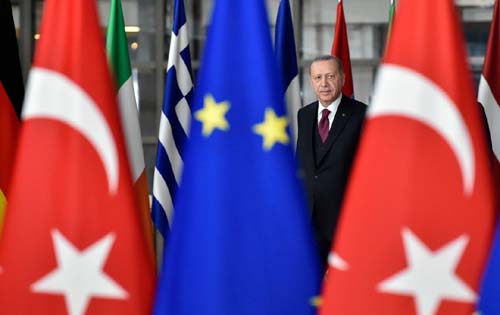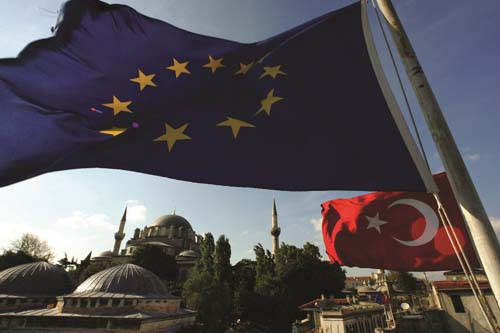
Turkey’s EU accession prospects remain bleak
Yasar Yakis
The European Parliament this month issued its periodical “progress report on Turkey.” Turkey’s pro-opposition media considers these reports to be the country’s magnetic resonance imaging, allowing an accurate picture of Turkey to be seen. The pro-government media regards these reports as aiming to blackwash Ankara’s reputation.
The latest report is not much different from the previous ones. The core criticisms remain intact but, as a result of several initiatives taken by Turkey in the international arena, Ankara is also praised for its achievements. Turkey’s role in keeping open the channels of communication between Russia and Ukraine is a laudable achievement and the European Parliament did not miss the opportunity to praise it.
The report was adopted with 448 votes in favor, 67 against and 107 abstentions. The breakdown of the votes is an indication of the divided nature of the parliamentarians regarding Turkey. In fact, the parliament welcomed “the recent slight improvement” in overall Turkey-EU relations and the high-level dialogues, but it did not spare any criticism in many other fields.
It welcomed Turkey’s willingness to act as a mediator in the Russian war against Ukraine and stressed the vital importance of Turkey-EU cooperation in foreign and security issues. The European Parliament brings this role of Turkey to the forefront partly because it is a laudable effort, but more so because the EU and NATO want to keep Turkey on their side to ensure that Ankara does not cooperate more closely with Russia. So far, Turkey has been able to properly observe this fragile balance.
The EU has always been fair in praising Turkey’s efforts in hosting the largest refugee population in the world, but this time it has gone one step further. The report also refers to the sustained provision of EU funding for this purpose. Turkey usually complains about the slow progress in the provision of funds and in particular about the strict rules that Brussels imposes over its disbursement.
Updating the Turkey-EU customs union is a subject that has been on the agenda for years. Ankara has asked umpteen times for it to be updated. The EU sometimes ignores this request, while only paying lip service to others. This time, it repeats the goal but also attaches new conditions to its implementation and the general tone of the report is as gloomy as always.

Turkey has the right to block the accession of any new member, but this subject has to be handled with the utmost care.
The report reminds us that, despite Turkey’s repeated statements that it aims to become an EU member, the country has consistently gone back on its commitments in relation to the accession process. In the run-up to the parliamentary and presidential elections to be held in Turkey in June next year, or perhaps earlier, it is not realistic to expect any improvement in this field.
The slight improvement referred to earlier is immediately counterbalanced with a negative note, which says: “This enhanced cooperation has unfortunately coexisted alongside regular conflicts, as relations with neighboring EU member states (meaning Greece and the Greek Cypriots) remain challenging.”
The European Parliament report also points to the continued deterioration of the human rights situation in Turkey and regrets the sustained legal and administrative pressure on civil society and human rights defenders, lawyers and journalists. It calls on the European Commission to provide sufficient funding for pro-democracy efforts in Turkey. This suggestion is more than enough for the government to further curb the activities of human rights defenders and pro-opposition journalists.
The European Parliament thus reiterates that it cannot, at this stage, justify its position concerning a formal suspension of the accession negotiations with Turkey, which have effectively been at a standstill since 2018. The report singles out the case of philanthropist and human rights activist Osman Kavala because the Turkish judiciary has refused to implement a verdict on his case by the European Court of Human Rights.
Another important and controversial issue is Turkey’s objection to Sweden and Finland’s NATO membership applications. Turkey has the right to block the accession of any new member, but this subject has to be handled with the utmost care.
Turkey’s opposition to Sweden and Finland’s accession to NATO is still an ongoing process. If NATO acts too slowly, there may be the risk of a deterioration in the security situation on Russia’s border with Finland. Turkey cannot carry the responsibility of such a risk. In 2008, NATO was too slow in processing Georgia’s admission. If Georgia and Ukraine were admitted through an accelerated procedure, the Georgian war of 2008 and the present Ukrainian war could have been avoided, because Russia would have thought twice before carrying out its military operations in both countries. Article 5 of the treaty — which sets out the principle of collective defense — would have deterred it.
The history of humankind must be full of such missed opportunities.
The writer is a former foreign minister of Turkey and founding member of the ruling AK Party
